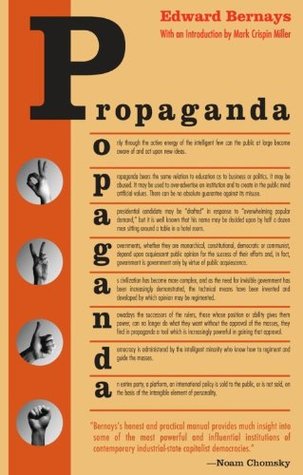More on this book
Community
Kindle Notes & Highlights
propaganda was a term so unimportant that there is no definition for it in the great 1911 Encyclopedia Britannica (which does include a short entry for propagate).
1915
Now “public opinion” stood out as a force that must be managed, and not through clever guesswork but by experts trained to do that all-important job.
The nascent field of public relations also had been disesteemed by those atop the social pyramid, who saw that sort of work as necessary only on the vaudeville circuit and on Broadway.
The great Allied campaign to celebrate (or sell) Democracy, etc., was a venture so successful, and, it seemed, so noble, that it suddenly legitimized such propagandists, who, once the war had ended, went right to work massaging or exciting various publics on behalf of entities like General Motors, Procter & Gamble, John D. Rockefeller, General Electric.
And so, from the signing of the Versailles Treaty to the Crash of 1929, there was high excitement in the booming field of peace-time propaganda. That reborn generation of admen and publicists, no longer common hucksters but professionals, sold their talents to Big Business through a long barrage of books, essays, spe...
This highlight has been truncated due to consecutive passage length restrictions.
That quasi-religious pitch was memorably made in books like Earnest Elmo Calkins’s Business the Civilizer (1928), Bruce Barton’s best-selling parable The Man Nobody Knows (1925), and, less distinctively, in countless other works of what we might call propaganda propaganda.
George Creel, director of the U.S. Office of War Information, in How We Advertised America (1920). The Germans having trashed the word, Creel claims, the Americans never used it to refer to their own output, but—rightly—favored other, more exalted terms instead: “Our effort was educational and informative throughout, for we had such confidence in our case as to feel that no other argument was needed than the simple, straightforward presentation of facts.”6 That passage is itself, of course, a stunning bit of propaganda,
How the German propaganda “had come to be associated with deceit and corruption” is a question Creel would rather not address, preferring instead to bury it in that sly (if sly it was) passive construction.
The world informed by “public relations” will be but “a smoothly functioning society,” where all of us are guided imperceptibly throughout our lives by a benign elite of rational manipulators.
we vote and what we deem as good or bad. “They govern us,” the author writes, “by their qualities of natural leadership, their ability to supply needed ideas and by their key position in the social structure.”
Derived from the positivism of the 19th century (and indirectly bolstered by the work of Bernays’s uncle, Sigmund Freud), this neo-Baconian conception of the propagandist’s power was surely not Bernays’s invention.
lifelong commitment to a stringent code of ethics for all p.r. specialists. But the issue here is not so much ethical as epistemological. In a world under the influence of propaganda experts, how does a costly truth get out into the world as truth?
Other of Bernays’s campaigns were likewise meant to preempt all discussion, if not all conception, of some rational alternatives to the established ways of doing business.
In 1929, for instance, Bernays mounted “Light’s Golden Jubilee.”
the “Jubilee” was but a stroke of propaganda on behalf of General Electric and its National Electric Light Association (NELA), which was the secret means of GE’s stranglehold on America’s electric power. From 1919 until 1934, NELA carried out the largest peacetime propaganda drive in U.S. history, intended to discourage public ownership of the utilities. That private capital should wield complete control over the nation’s power supply was a notion evidently not to be debated.
The conscious and intelligent manipulation of the organized habits and opinions of the masses is an important element in democratic society. Those who manipulate this unseen mechanism of society constitute an invisible government which is the true ruling power of our country.


